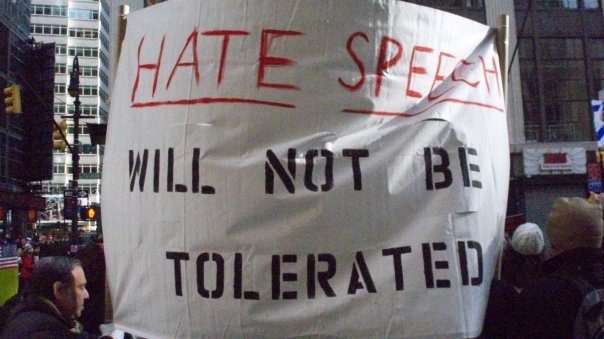Like this article? rabble is reader-supported journalism. Chip in to keep stories like these coming.
Last month, blogger Daryush Valizadeh, better known by his online moniker Roosh V, cancelled his Return of Kings rallies planned across the globe, ironically due to safety concerns.
Valizadeh has attracted much outrage for his misogynistic and hateful views including the stance that rape inside a private home should be legal.
The perpetuation of hatred against the LGBTQ community, women, Jewish individuals and his neo-nazi idolism has placed him at the centre of difficult legal quandaries.
The private-public boundaries that he and his followers tip-toe have many questioning what, if anything, can be done federally about anyone perpetuating hate speech that is situated ambiguously between the private and public spheres.
The federal legal pathways protecting freedom of expression, yet protecting against hate speech are blurry.
Pushing back against hate groups: The Roosh V case
Valizadeh originally planned 10 meetings in Canadian cities where heterosexual men — the only men who are “allowed” to attend — would confirm they had found the designated location by cautiously asking each other “where the pet shop is.”
The rallies were publicly denounced by several mayors and numerous women’s groups and individuals.
In Toronto, Savoy Howe, owner of the Toronto Newsgirls Boxing Club, planned to protest the meetup, boxing gloves in tow. Howe and her “army of women” repeated that while they do not advocate violence, they are happy to use their skills to defend themselves, and inspire others to do the same.
After the meetup was cancelled, the group instead offered a “learn-to-punch” rally.
Online activist group Anonymous also reportedly got involved, allegedly leaking personal information about Roosh V, such as his family’s address and phone number.
In July 2015 a petition was circulated against Valizadeh urging Canadian border security to prevent him from entering the country. Citing the Southern Poverty Law Center (SPLC) as identifying Valizadeh and his followers as being “hate-based”, the authors of the petition also invoked section 319 of the Canadian Criminal Code to defend their position.
Section 319 of the Canadian Criminal Code specifically deals with Hate Propaganda.
“Communicating statements, in any public place, [that] incites hatred against any identifiable group where such incitement is likely to lead to a breach of the peace,” according to the Criminal Code, is illegal.
However, conflicts between what is considered hate speech and what is considered freedom of expression continue.
Conflicts continue between hate speech vs. freedom of expression
In 2009, Section 13 of the Canadian Human Rights Act, otherwise known as the “hate speech section” was ruled unconstitutional. This ruling came after a case against right-wing activist Marc Lemire. The court ruled that Lemire was guilty of violating Section 13 by reposting a racist and homophobic article, originally written by an American neo-nazi, on his website entitled AIDS Secrets.
In June 2012, Conservative MP Brian Storseth sought to remedy the problem of this “poorly written” section of the Canadian Human Rights Act. In doing so Storsteh introduced legislation that repealed Section 13 of the Canadian Human Rights Act.
During the debates regarding the legitimacy of Section 13 Storseth defended his position by openly classifying Canada’s human rights tribunal as “a quasi-judicial, secretive body that takes away your natural rights as a Canadian.” In June 2013, the Senate voted to repeal Section 13.
Cara Zwibel, director of the fundamental freedoms program at the Canadian Civil Liberties Association (CCLA), stated that the CCLA was “pleased with the repeal” because Section 13 had “some serious problems from a freedom of expression perspective.”
However, human rights lawyer Richard Warman touts Section 13 as regulating hate speech such as, neo-nazi hate propaganda on the Internet, as well, reminding us that “virtually every other Western democracy has these kinds of civil law controls on hate speech.”
However, a Federal Court of Appeal ruling in January 2014 ruled that Section 13 is actually constitutionally valid.
For individuals who find Valizadeh troubling, this ruling does not necessarily make the legal recourse simpler.
Although Section 13 has been ruled constitutional, it has not yet been reinstated. Therefore, the only legal means federally to fight hate propaganda in Canada is via the criminal code. These are rarely pursued due to the fact that they require the approval of the provincial Attorney General.
Provincially, laws differ and largely rely on when and where the hate speech occured. Therefore, instances occuring online tend to fall under federal law.
When the lines between online spaces and public places are crossed, this complicates matters further, as specific legislation is often designated for online forums, with others being for physical public spaces.
No legislation would be seen as legitimate if it is simultaneously viewed as compromising freedom of expression.
A. Splawinski is a student at the University of Toronto. Previously, she worked as a producer and host of News Now on CHRY 105.5 FM covering Canadian social, political, and environmental issues. You can visit her personal blog www.lionpolitics.tumblr.com and follow her on twitter @asplawinski.
Photo: flickr/ Ashley Marinaccio



